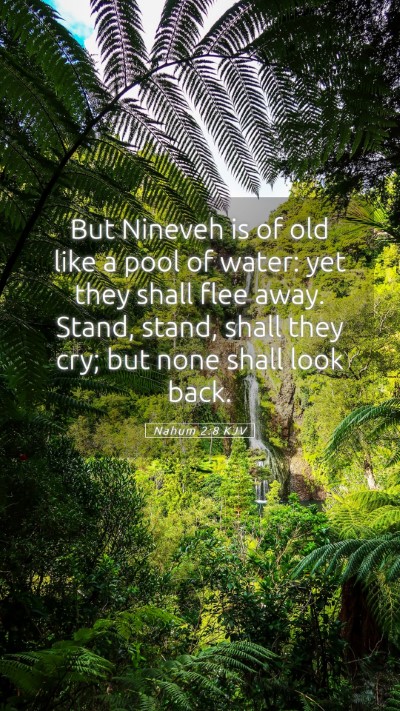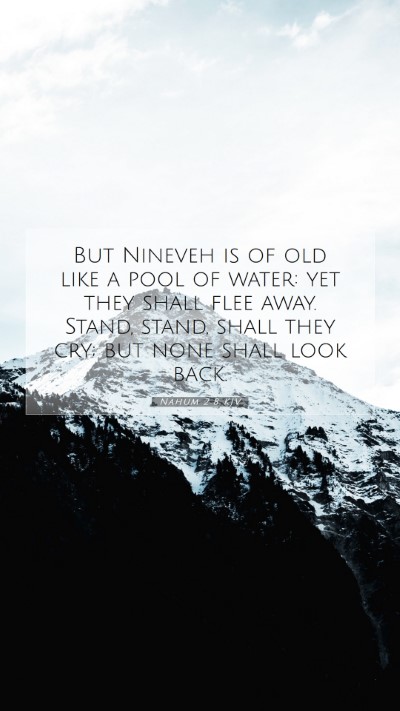Old Testament
Genesis Exodus Leviticus Numbers Deuteronomy Joshua Judges Ruth 1 Samuel 2 Samuel 1 Kings 2 Kings 1 Chronicles 2 Chronicles Ezra Nehemiah Esther Job Psalms Proverbs Ecclesiastes Song of Solomon Isaiah Jeremiah Lamentations Ezekiel Daniel Hosea Joel Amos Obadiah Jonah Micah Nahum Habakkuk Zephaniah Haggai Zechariah MalachiNahum 2:8 Meaning
What is the meaning of Nahum 2:8?
But Nineveh is of old like a pool of water: yet they shall flee away. Stand, stand, shall they cry; but none shall look back.
Nahum 2:8 Bible Verse Meaning
Nahum 2:8 - Bible Verse Meanings and Explanations
Verse: "But Nineveh is of old like a pool of water: yet they shall flee away. Stand, stand, shall they cry; but none shall look back." (Nahum 2:8, KJV)
This verse from the book of Nahum serves as a profound commentary on the impending downfall of Nineveh, the capital of Assyria, and holds significant lessons for readers today. Below, we explore insights from historical commentaries to unravel its deeper meanings.
Understanding Nahum 2:8
Contextual Background:
Nahum's prophecy focuses on the impending destruction of Nineveh, a city historically known for its wealth and power, but also for its cruelty and violence. By the time of Nahum's writings, the Assyrians had instilled fear throughout the region, and this prophecy explicitly calls into question their perceived invincibility.
Bible Verse Commentary
Matthew Henry: Henry emphasizes the metaphorical imagery of Nineveh as a 'pool of water', suggesting that while it may seem abundant and secure, its destiny is marked by volatility and depletion. The phrase "they shall flee away" underscores a prophetic declaration of panic and disorder as the might of Nineveh crumbles.
Albert Barnes: Barnes adds depth by examining the 'pool of water' as a symbol of the fleeting nature of Nineveh's wealth and security. He suggests that just as pools eventually dry up, so too will Nineveh's glory disappear, leading to the city’s ultimate retreat and despair. The exhortation 'Stand, stand!' illustrates the debilitating fear that will overcome its inhabitants.
Adam Clarke: Clarke provides a theological perspective, noting how the divine judgment signifies that flight will not lead to safety. His commentary hints at a spiritual truth—those who rely solely on their strength or resources will find that true security lies in faithfulness to God, a lesson illustrated by Nineveh's plight.
Key Lessons and Applications
Lessons Learned:
- The temporary nature of power and wealth.
- The importance of repentance and humility before God.
- Recognizing that human strength is no match for divine judgment.
In-depth Bible Verse Analysis
This verse serves as a poignant reminder of the transitory nature of earthly kingdoms and the ultimate sovereignty of God. Those who engage in Bible study insights or Biblical exegesis can draw practical applications from this passage, marking it as a cautionary tale against hubris and assurance of God's justice.
Historial Context
In examining the historical context of Bible verses, it's essential to recognize that Nineveh was seen as a powerhouse of the ancient world. The Assyrians employed violent tactics through warfare and political manipulation, leaving a trail of devastation. Nahum’s prophecy parallels the cycle of judgment and mercy presented throughout the Scriptures.
Cross References
Looking deeper into the connections with other scriptures, we find significant parallels that enhance our understanding of Nahum 2:8:
- Jonah 3:5-10 - Jonah’s earlier prophetic warning to Nineveh and their momentary repentance.
- Lamentations 3:22-23 - The theme of God's mercy contrasted against impending judgment.
- Isaiah 10:5-19 - Prophecies concerning the fall of the Assyrian empire.
- Habakkuk 2:6-8 - A warning against greedy nations, directly applicable to Nineveh.
- Revelation 18:2 - The fall of another 'great city', paralleling the themes of judgment.
FAQs Related to Nahum 2:8
What does Nahum 2:8 mean?
This verse illustrates the chaotic flight and disarray that will come to the people of Nineveh, highlighting the consequences of their sin and the certainty of God's justice.
Can I use Nahum 2:8 for daily life application?Yes! This verse serves as a reminder of the importance of relying on God rather than worldly systems of power, encouraging a consistent pursuit of righteousness.
Conclusion
In summation, Nahum 2:8 stands as a powerful testament to the consequences of pride and the inevitability of divine judgment. For those engaged in Bible study groups or pursuing online Bible study, understanding the implications of this verse provides critical insights into the character of God, human frailty, and the assurance that justice prevails. As we reflect on the fate of Nineveh, we are called to seek deeper Bible verse interpretations that emphasize repentance and reliance on God.


